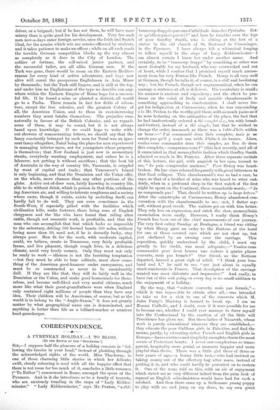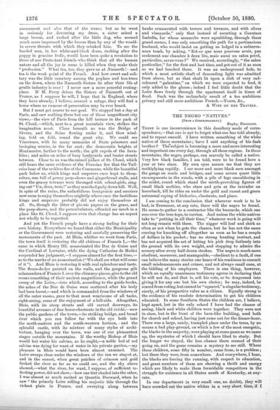CORRESPONDENCE.
A PYRENEAN HOLIDAY.—I. TO BLOTS.
Pro THE EDITOR OF THE "SPECTATOR."] suppose half the pleasure of a holiday consists in "fol- lowing the fancies in your head," instead of plodding through the acknowledged sights of the world. Mies Thackeray, in one of those charming little stories in which her delicate, swift, cloudy colouring is used with all the happier effect that there is not room for too much of it concludes a little romance (" To Esther ") commenced in Rome, amongst the spurs of the Pyrenees. And in it she introduces us to a family of tourists, who are anxiously treading in the steps of "Lady Kidder- minster." "Lady Kidderminster," says Mr. Penton, " a-6W-
beancoup-frappee-par-une-Cathedrale dans-les-Pyrenees. Est- ee qu'elle-a-passe-par-ici ?" and here be tumbles over the legs of poor Geoffry Smith, who is sitting at the feet of a statue in the old church of St. Bertrand de Counninges, in the Pyrenees. I have always felt a whimsical longing to follow myself in the steps of Lady Kidderminster—I am almost certain I know her under another name. And certainly, to be " beaucoup frappe" by something or other was most desirable for my husband, who was overworked and out of heart, while I confess That I promised myself much amuse- ment from his very Penton-like French. Henry is all very well at German, though be talks it, of course, in a stiff and hesitating way ; but his French, though not ungrammatical, when he can manage a sentence at all, is delicious. His vocabulary is small ; his manner is anxious and expository ; and the effect he pro- duces on the mind of lively and amiable chambermaids is something approaching to consternation. I shall never for- get his indignation at Carcassonne, when be was expounding
a in Mr. Penton to the worthy girl there, with as much pains as if he were lecturing on the antiquities of the place, the fact that
he had inadvertently ordered a the complet (i.e., tea with bread- and-butter), instead of a the simple, but that he wished to change the order, inasmuch as there was a fable d'hete within an hour :—" J'ai commande deux thes complets, mais je no savais pas gull y avait une table d'hôte it six heures. Alors, voulez-vous commander deux thes simples, an lieu de deux thes complets,—comprenez-vous ?" (this last severely, and all of it enunciated in that monosyllabic fashion which Geoffry Smith admired so much in Mr. Penton). After three separate recitals
of this lecture, the girl, with anguish in her eyes, turned to me, " Je puis comprendre madame." Poor Henry was heart- broken. He has since referred frequently with great bitterness to that final collapse. This chambermaid's was as bad a case, he
says, as that of a brother of mine who was heard to utter sud- denly, when in a profound sleep in the first watch of the first
night he spent on the Continent, these remarkable words,—" Je ne eomprends pas ! That should be written up in large letters." After the catastrophe at Carcassonne, Henry abandoned con- versation with the chambermaids to me,—not, I flatter my-
self, without good result. The waiters get on with him better. They rely less on expression, and catch the slow, monosyllabic enunciation more easily. However, I really think Henry's French has been one of the chief amusements of our journey,. The very first sultry Sunday at Boulogne, a friend was sitting by when Henry gave an order to the Buttons at the hotel for one of those covered cars which are not shut up, but just sheltered by an awning over the carriage. This exposition, quickly understood by the child, I must say greatly to his credit, was most adequate,—" Voulez-vous commander pour deux heures tine voiture a quatre places couverte, mais pas fermee ?" Our friend, as the Buttons departed, heaved a great sigh of relief. "1 think your hus- band and I," he said to me, "are just about in equally strait-waistcoats in France. That description of the carriage wanted was most elaborate and impressive !" And really, to have fun of this sort going on every day is no small addition to the enjoyment of a holiday.
By the way, that " voiture couvcrte, mais pas fermee,"— which it was impos:ible to obtain after all,—was intended to take us for a visit to one of the convents which M. Jules Ferry's Ministry is formed to break up. I am no Roman Catholic, and I doubt, even if it were possible for me to become one, whether I could ever manage to force myself into the Confessional by the exertion of all the little will Providence has given me. But these ladies of Nazareth, whose work is purely educational wherever they are established,— they educate the poor Galilean girls in Palestine, and find the means, partly, by educating richer French and English girls in Europe,—have sweetness and simplicity enough to charm the most severe of Protestant hearts. I never saw complexions Ro trans- parent, hospitality more genial, or manners happier and more playful than theirs. There was a little girl there of three or four years of age,—a bonny little trot,—who had insisted on taking money out of the offertory bag after mass, instead of putting it in, and who could hardly be prevailed on to restore it. One of the nuns told us this, with an air of enjoyment which struck me as very different indeed from the prim look of reproof an English schoolmistress would have had for such a misdeed. And then there came up a frolicsome young puppy to play with me and jump on my dress, to my own great amusement and also that of the nuns ; but as he went in seriously for _devouring my dress, a sister seized a large broom, and rushed after the little dog, who seemed much more impressed by the broom than by any of the would- be severe threats with which they rebuked him. To see the hooded nun, in her white-and-black dress, rushing after the puppy in genuine frolic, would have been quite a revelation to those of our Protestant friends who think that all the human nature and all the joy in nuns is killed when they make their "profession." What tea, too, they gave us at Nazareth !—and tea is the weak point of the French. And how sweet and soli- tary was the little cemetery among the poplars and box-trees on the down, where the Nazareth Sisters lie after their life of gentle industry is over ! I never saw a more peaceful resting- place. If M. Ferry drives the Sisters of Nazareth out of France, as I suppose he will, I hope that in England, where they have already, I believe, secured a refuge, they will find a home where no rumour of persecution may be ever heard.
But I must get nearer to our goal. We stopped but a day at Paris, and saw nothing there but one of those magnificent city views,—the view of Paris from the hill terrace in the park of St. Cloud,—which, next to a great mountain view, strikes the imagination most. Close beneath us was the Bridge of Sevres, and the Seine flowing under it, and then wind- ing, fold on fold, round the great city. We could see Vincennes, with its many memories of State prisoners and besieging armies, in the far east; the democratic heights of Montmartre, farther to the north ; the gilt cupola of the lava- lides ; and miles on miles of busy boulevards and busier streets between. Close to us was the.ruine-d-Race of St. Cloud, which still bears the same evidence of the Prussian fire that the Tuil- eries bear of the reckless fire of the Commune, while the beautiful park below us, which kings and emperors once kept to them- selves, was full of penny peep-shows and gingerbread stalls, and even the grassy terraces were thronged with school-girls, sing- ing out" Un, deux, trois !" as they marched gaily downhill. Well, in spite of the ruins, the unfastidious bourgeoisie and onvriers now seem to enjoy themselves mightily where once the fastidious kings and emperors probably did not enjoy themselves at all. So, though the litter of pic-nic papers on the grass, and the peep-shows, and the perambulators, offended me much in a place like St. Cloud, I suppose even that change has an aspect not wholly to be regretted.
And yet the French people have a strong feeling for their own history. Everywhere we found that either the Municipality or the Government were restoring and carefully preserving the monuments of the past. At Blois, whither we went from Paris, the town itself is restoring the old chateau of Francis I.,—the same in which Henry III. assassinated the Duo de Guise and the Cardinal of Lorraine, while the dying Catherine de Medici suspended her judgment,—I suppose almost for the first time,— as to the merits of an assassination (" We shall see what will come of it "). And Blois is restoring it with real splendour and taste. The fleurs-de-lys painted on the walls, and the gorgeous gilt salamanders of Francis I. over the chimney-pieces, give to the old rooms something of their ancient magnificence, while the grand sweep of the Lire,—into which, according to the guide-books, the ashes of the Due de Guise were scattered after his body had been burnt,—and which is commanded from the windows of all the outer rooms, gave to that most wearisome of all tasks, sight-seeing, some of the enjoyment of a hill-side. Altogether, Blois, with its steep streets and old carved doorways, its beautiful avenues of fine horse-chestnuts in the old evechg,—now the public gardens of the town,—its striking bridge, and broad river which you can follow far with the eye both into the north-eastern and the south-western horizon, - and the splendid castle, with its mixture of many styles of archi- tecture, hanging over the town, was one of our pleasantest stages outside the mountains. If the worthy Bishop of Blois would but water his salvias, as he ought,—a noble bed of red salvias was dying for want of water in his private garden,—my pleasure in Blois would have been almost unmixed. The Loire sweeps close under the windows of the inn we stayed at, and in the sunset, when great patches of crimson and gold flecked the river as far as we could see, and the sky above showed,—what the river, for want, I suppose, of sufficient re- flecting power, did not show,—how one tint shaded into the other, I was almost as much excited as Quentin Durward, when be saw "the princely Loire rolling his majestic tide through the richest plain in France, and sweeping along between banks ornamented AV all towers and terraces, and with olives and vineyards," only that instead of escorting a Countess Isabella, for whom monarchs were squabbling, through these grand scenes, I was only smoothing the path for a pertinacious husband, who would insist on getting us lodged in a subterra- nean tomb, by asking, " Est-ce quo nons pouvous avoir, pas senlement une chambre a deux lits, mais aussi nu salon privd, particulier, savez-vous ?" We received, accordingly, "the salon particulier," for the first and last time, and got out of it as soon as we had lunched there. It was an underground hole, to which a most artistic shaft of descending light was admitted from above, but as that shaft lit upon a dish of very sad- coloured "galantine," on which we were expected to feed, it only added to the gloom ; indeed I feel little doubt that the Loire flows freely through the apartment itself in times of flood. Such was the melancholy result of a too ambitious privacy and still more ambitious French.—Yours, &c.,
A WIPE ON HER TRAVELS.







































 Previous page
Previous page